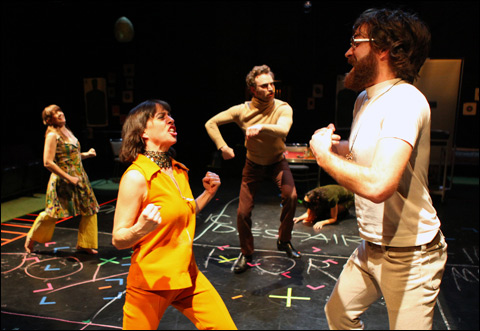
PROCESS VERSUS PRODUCT: In staging a rehearsal of a fictional production of Streetcar, the Rude Mechs suggest that the pursuit of greatness can be as exhilarating as the attainment of it. |
ArtsEmerson began its theatrical season by revisiting The Laramie Project, in which the Tectonic Theater Project interviewed Laramie citizens about the murder of Matthew Shepard. The latest import — in which Austin's Rude Mechs revisit drama teacher Stella Burden in 1972 as she walks out on her company after extensively training it to perform A Streetcar Named Desire — would not seem to be as ennobling.
But don't dismiss The Method Gun (through Sunday at the Paramount Black Box). At the heart of this strange presentation about an even stranger presentation is a quite moving ode to teachers, even those who're as nutty as a fruitcake. And as drama teachers go, Burden was about as lunatic as they come. Her idea was to rehearse A Streetcar Named Desire for nine years before performing it. But not just any Streetcar. This would be a Streetcar with all the original dialogue — except for the words spoken by Stanley, Stella, Blanche, and Mitch. Which is tantamount to re-creating a Beatles album by playing only the notes that John, Paul, George, and Ringo didn't play.
So, are we watching a satire of acting methods, or a tribute? Does Stella Burden exist at all?
For the moment, let's put Streetcar and Stella aside in favor of asking why the Rude Mechs — notably writer Kirk Lynn, director/actor Shawn Sides, four other actors, and a tiger (don't ask) — would be so interested in Burden's company. That question is what will hold your attention as they go through stiff-looking kissing practices and their own psychodramas — which include attaching balloons to the male members of the two male members as they rehearse the play.
And the answer, after an often perplexing, often intriguing 90 minutes, is that as wacky as it all might be on the surface, the pursuit of greatness, or at least great art, can be as exhilarating as the attainment of it. The idea is somewhat reminiscent of the magnificent ending of the backstage-drama TV show Slings & Arrows, which suggested that a special production seen by a handful of people is far more meaningful than a merely good performance seen by thousands.
Burden's "Approach" (as in "Method," and, yes, it is fictional) stresses danger — emotional and physical — to get the actors to dramatic nirvana. And the Rude Mechs — in a blend of performance-art monologue, ironic detachment, absurdist humor, and precise blocking — are more than up to the challenge. Their dodging of stage lights at the end of the show almost proves that all the silly training techniques earlier in the performance were worth the effort.
The problem is that they don't quite make the case. The Streetcar Named Debacle performance is no less terrible for all the precise blocking techniques or the talent of the Rude Mechs. The actors leave you with the sense that you're watching a riddle wrapped inside an enigma. Can the payoff be profound if there is no payoff? Can excellence be rewarding if no one (you included) sees the endeavor as anything but silly?
Perhaps this is putting too much of a burden (yuk, yuk) on the Rude Mechs (who take their name from the Rude Mechanicals of A Midsummer Night's Dream). Entertainment can be reward enough, and the Austinians are definitely entertaining. A dance to creativity by cast standout Thomas Graves, the aforementioned dodging of lights, and the salute to teachers everywhere are all fine theater. But the Rude Mechs seem to be desperately searching for more than traditional theater could give them. They shouldn't blame us for wanting the same thing from them.